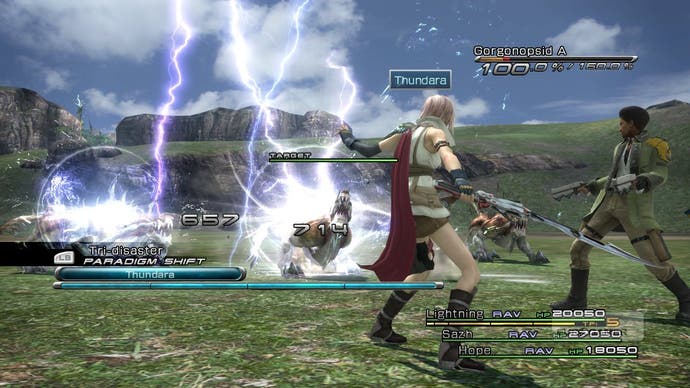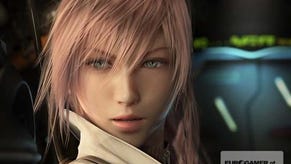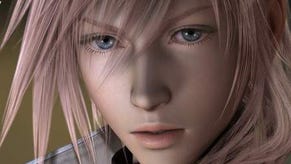Final Fantasy XIII
Kitase and Toriyama on the Western reaction and going multiformat.
"We did actually take a look at games like BioWare's, and Fallout as well," he says. "But rather than that, we took more inspiration from FPS games like Call of Duty and Halo. Those games seems to present a very real-time, tense atmosphere on the battlefield where the player gets involved in the fighting. That's the kind of thing that we looked at more intensely."
Not all fans wanted a follow-up to the bold and divisive XII, of course, and Square Enix must be used by now to the seesaw of approval in the Final Fantasy community from one title to the next (no-one ever likes two in a row, it seems, but one man's VII is always another man's VIII). One constant, however, is wholesale change to the battle system.
"It is the natural tradition in the Final Fantasy series that each numbered title should come up with a new battle system," Toriyama notes. "Therefore you may find the battle system in XIII very different from past titles - with the intention from us indeed that the battle system should be very enjoyable for action gamers as well.
"If you study the battle system of this game, you will understand that there is something called Paradigm Shift incorporated, which is a brand-new concept." Paradigm Shift allows you to switch the playable character between classes - such as Medic or Ravager, an offensive mage - on the fly during battle, which automatically changes the AI behaviour of your party members, too.
"Indeed, you basically operate the playing character only, but at the same time you will get the kind of feel as though you were, in a way, controlling all three members of the party. It's not just that you have to concentrate on one character - it's one main one and two others."
The biggest change, though, is the one that made the most headlines at E3 two years ago: the fact that Final Fantasy XIII is launching simultaneously on PS3 and Xbox 360 in the West.

"We actually had already designed the basic engine in a way that it would be able to comply with both consoles anyway, so we didn't experience any huge technical challenges," Kitase says when asked about the difficulties this presented the team.
"But the only difference is that obviously Blu-ray and DVD are different, so the Xbox version has three DVDs, so there's compression, and also the player will have to change the disc twice during gameplay." (You can read much more about this side of Final Fantasy XIII in Digital Foundry's detailed technical analysis.)
With reviews of the Western game embargoed until the day before release, it will be a few weeks before we find out whether Kitase and Toriyama's optimism about Final Fantasy XIII translates into critical acclaim to counter those muted early write-ups - we'll certainly be withholding our own judgement until we're much deeper into the game's world. But with the developers' boss Yoichi Wada on the record saying that the Final Fantasy XIII approach to production is increasingly anachronistic, it may signal the end of an era either way.
But that's the thing about this series. Born as a young Square faced bankruptcy in 1987, it was named by creator Hironobu Sakaguchi in recognition of the fact that it could well be his and the company's final game. Of course, it ended up saving the day and its title has taken on a tinge of irony. Nevertheless, despite its traditionalism, it has never lost that spirit of last-ditch reinvention; with every entry creating a new world and battle system from scratch, every Final Fantasy is necessarily the end of an era - and the beginning of one. There's no reason to think Final Fantasy XIII will be any different.
Final Fantasy XIII is due out for PS3 and Xbox 360 on 9th March.








